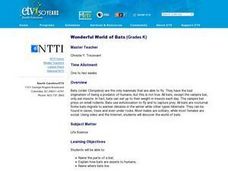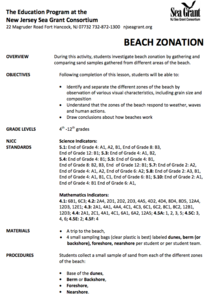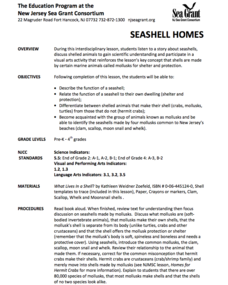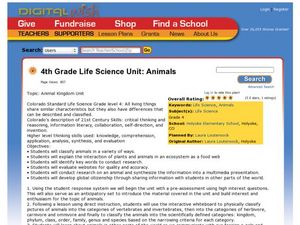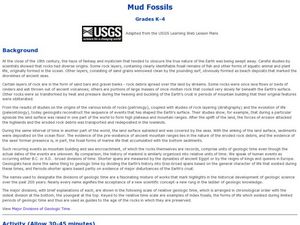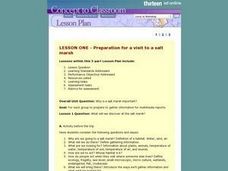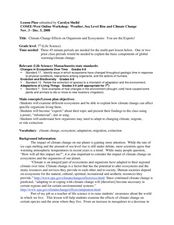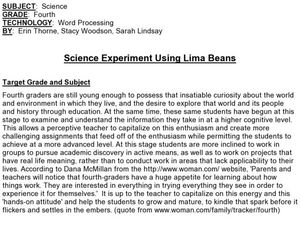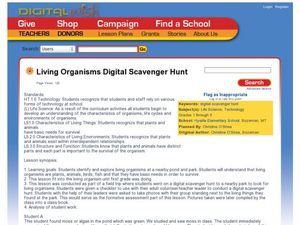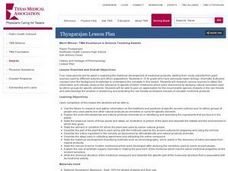Curated OER
Wonderful World of Bats
Students create a book about bats. They write a letter to a scientist containing questions about bats. They compare the socialization of bats to humans; compare the needs of bats to humans and other animals.
Curated OER
Field Trip Preparation
Students prepare for a field trip. They navigate through a Underground Network site. This "field trip" can be conducted in a patch of healthy grass or soil anywhere you can find it: right outside your building, in a backyard or at a...
Curated OER
Beach Zonation
Young scholars investigate the characteristics of the beach environment and explore beach zonation. After gathering samples from different areas of the beach, young scholars discuss how the beaches work and the characteristic of each...
Curated OER
Seashell Homes
Pupils listen to a story about seashells. They discuss shelled animals. Learners describe the function of seashell. Pupils relate the function of a seashell to their own dwelling. They differentiate between shelled animals that make...
Curated OER
4th Grade Life Science Unit: Animals
Fourth graders classify animals. In this animal kingdom lesson, 4th graders research animal habitats and behaviors. Students connect to a zoologist via SKYPE and learn about animal classification. Students blog about preserving animal...
Curated OER
Mud Fossils
Young scholars observe real fossils. In this science lesson, students make their own mud fossils by pressing material into the mud and letting it dry in the sun for 3-4 days. Young scholars then get the fossils out displaying their mud...
Curated OER
Classifying Commercial Marine Species
Learners investigate taxonomy. They explore some of the commercial marine species caught in Magdalena Bay and develop a classification system for presented animals.
Curated OER
Why is a salt marsh important?
Middle schoolers discuss the salt marsh. They define the following terms: habitat, water, land and air. Students work in small groups. They are asked why are they going to a salt marsh? Middle schoolers discuss whose habitat is it at...
Curated OER
Biotic and Abiotic Factors
In this biotic and abiotic factors learning exercise, students complete 20 various types of questions related to biotic and abiotic factors. First, they write the vocabulary word that best completes the sentence. Then, students state an...
Curated OER
Cloning
For this cloning worksheet, students will read a paragraph about how cloning has been a benefit to medicine and agriculture. Students will underline the main idea in the paragraph and write down three supporting details. Then students...
Curated OER
Book Excerpt from "The 23rd Cycle"
In this solar storms instructional activity, students read an excerpt from the book "The 23rd Cycle: Learning to Live with a Stormy Star". Students answer 7 questions about the effects of solar storms on radiation exposure, health risk...
Curated OER
This I Can Do: The Drive
Learners read The Garden of Happiness and discuss the importance of the common good in a community. In this common good instructional activity, students understand how overcoming diversity and working together for a neighborhood drive....
Curated OER
Paper Makers
Students make recycled paper out of scrap paper, water, and leaves. In this natural resources lesson plan, students learn about conservation of the forest and how we can use recycled paper to fuel our paper supply.
Curated OER
Ecosystem Game
Students examine the ecosystem by playing a game. In this ecosystem lesson, students are put into groups of decomposers, consumers, and producers. Students create a list of animals that fit into each group and items that represent...
Curated OER
Map Your State: Regions of Arizona
Fourth graders define vocabulary and locate physical features on maps. In this mapping lesson plan, 4th graders explore regions of Arizona through landforms found on topographic maps. Students research the history and culture of the...
Curated OER
Climate Change Effects on Organisms and Ecosystems: You are the Experts!
Seventh graders research about the effect of climate on different ecosystems. In this life science lesson, 7th graders present their research by creating a poster, infomercial, skit or song. They discuss how organisms adapt to climate...
Curated OER
Photosynthesis and Cell Respiration
Fifth graders participate in scientific inquires regarding the concepts of photosynthesis and cell respiration. In this photosynthesis and cell respiration lesson, 5th graders describe the process of photosynthesis with relation to...
Curated OER
Science Experiment Using Lima Beans
Fourth graders tie together elements about the world and their environment. Students incorporate styles of higher order thinking skills. Students measure skills of observations, conclusions, inferences and predictions.
Curated OER
Ecoregions of Texas
Students map the ecoregions in Texas and illustrate the vegetation native to the region. They will use their maps to investigate why prehistoric hunter-gatherers might have decided to live in one area over another, such as the ancient...
Curated OER
Living Organisms Digital Scavenger Hunt
Students photograph living organisms. In this plan for a field trip, students go to a local park or pond and photograph themselves with various living organisms on their scavenger hunt list. The photographs taken are compiled into a...
Curated OER
Creating an Experimental Design
Young scholars research the damage to the environment by certain plant species. They create an experimental design which they test how these species take over certain habitats. They share their information with the class.
Curated OER
History and Heritage of Pharmacology
Twelfth graders research various sources to obtain the information and critically analyze the relevance to specific modern medicines which were discovered by studying natural remedies used by ethnic groups for specific ailments.
Curated OER
Fatty Acids
Students draw connections between chemical structures of fats and oils (lipids) and their use in food science and nutrition.
Curated OER
Fertilized Death Water
Students investigate the effect of chemicals on Platyhelminthes and planaria development. They observe the growth and development of planaria and investigate what fertilizer can do to living organisms when it is introduced into their...


